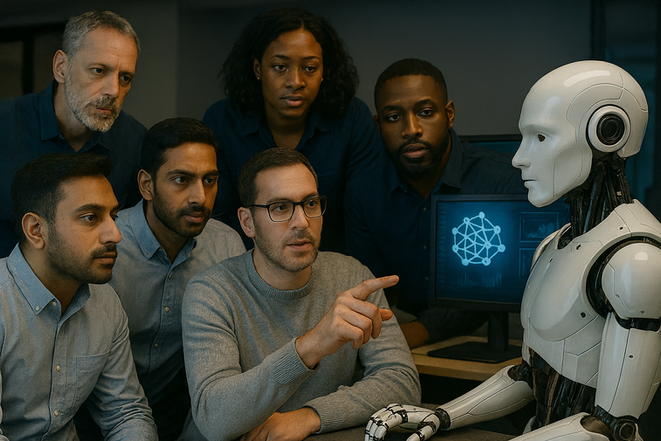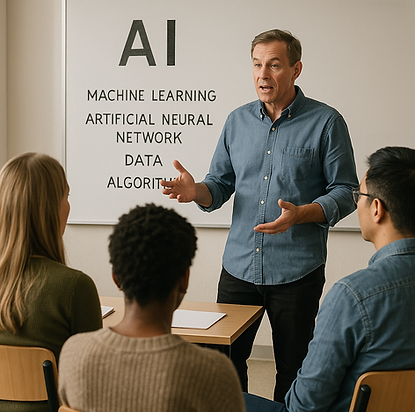
Jobs That Don't Exist Anymore Because of Technology:
Due to automation, robotics, and artificial intelligence, many jobs have become obsolete or are rapidly disappearing. This technological evolution has replaced human workers in roles that are repetitive, physically demanding, or can be performed with greater efficiency and accuracy by machines. AI Is Power for EVERYONE serves as a practical guide in this changing landscape, helping readers understand the forces behind these shifts and equipping them with the knowledge to adapt, stay relevant, and thrive in an AI-driven world.

Manufacturing and Manual Labor
Technological advancements during the Industrial Revolution and beyond have fundamentally reshaped these fields.
-
Factory Workers: Many positions on assembly lines for welding, painting, and other manufacturing tasks have been replaced by robots.
-
Pinsetters ("Pin Boys"): Before automated bowling equipment, young men were responsible for manually resetting the pins in bowling alleys.
-
Log Drivers: This job involved navigating large rafts of cut timber down a river to a sawmill. It was replaced by advancements in mechanized hauling and trucks.
-
Weavers and Textile Workers: The invention of the automated loom displaced many weavers and knitters who previously performed the work by hand.

Information and Communication
Technology has streamlined communication and data processing, rendering several jobs obsolete.
-
Switchboard Operators: Operators manually connected phone calls by plugging and unplugging cables. Automated electronic and digital systems have made this role almost entirely unnecessary.
-
Scribes: Before the printing press, scribes were tasked with laboriously hand-copying documents and books. Printing technology made their profession obsolete.
-
Typists and Word Processors: The widespread adoption of personal computers with word processing software eliminated the need for specialized typists and pools of keyboard operators.
-
Human Computers: Before electronic computers, people with strong math skills, often women, performed complex calculations by hand.
-
Data Entry Clerks: Automated software can now perform manual data entry tasks like parsing and extracting information faster and with more accuracy.
Transportation and Services
Automation has transformed the way goods and people are moved.
-
Elevator Operators: After automated elevators became standard, the role of manually operating lifts disappeared, though some still exist in a few older buildings as a service.
-
Lamplighters: This job involved lighting and extinguishing streetlamps by hand before the invention and widespread adoption of electric lighting.
-
Toll Collectors: Automated payment systems like EZ-Pass and FasTrak have replaced manual toll collection booths.
-
Ice Cutters and Delivery Workers: Before the invention of refrigeration, blocks of ice were harvested from frozen lakes and delivered to homes by horse and cart.

Retail and Clerical Work
Even more recent jobs have been disrupted or fully replaced by technological changes.
-
Video Store Clerks: Online streaming services and rental kiosks rendered video rental stores and their employees obsolete.
-
Travel Agents: The internet and online booking platforms have made it easy for consumers to plan and book their own travel, greatly reducing the demand for agents.
-
Bank Tellers and Cashiers: ATMs, online banking, and self-checkout kiosks have replaced a significant number of positions in these fields.
-
Film projectionists: Digital projectors have automated the process of showing films in theaters, removing the need for an operator to change reels.

What Emerging Jobs Offset Those Lost to Tech?
As technology eliminates certain repetitive or manual jobs, it creates new, specialized roles that require different skills, balancing the job market in an evolving economy. Instead of being a one-to-one replacement, the shift involves a transfer of tasks to machines while humans focus on activities that demand creativity, complex problem-solving, and social interaction. AI Is Power for EVERYONE provides readers with the foundational knowledge to understand these shifts, highlighting how AI terminology and concepts connect directly to the real-world skills and opportunities emerging today.
Here are examples of emerging job categories and specific roles that have been created or significantly reshaped by technology:

Artificial Intelligence (AI) and Machine Learning (ML)
-
AI and Machine Learning Specialists: These experts develop the algorithms and models that power intelligent applications, including predictive analytics, virtual assistants, and autonomous systems.
-
Prompt Engineers: This role focuses on optimizing the textual commands and inputs given to AI models to generate more accurate and useful responses.
-
AI Ethics Specialists: These professionals are responsible for addressing the moral and ethical implications of AI development and ensuring that AI systems are fair, transparent, and unbiased.
-
Data Scientists and Analysts: With technology generating massive amounts of complex, diverse, valuable, structured, and unstructured data, these workers are crucial for collecting, organizing, and interpreting it to provide business insights.
Cybersecurity
-
Information Security Analysts: As more of society's infrastructure moves online, these professionals are needed to protect networks and systems from cyberattacks. It is one of the fastest-growing fields in the tech sector.
-
Ethical Hackers: These specialists are hired to intentionally test a company's defenses by hacking into its own systems to find vulnerabilities and fix them before malicious actors can cause harm.
-
Cybersecurity Engineers: These professionals design, build, and maintain secure systems and applications by implementing firewalls, intrusion detection systems, encryption protocols, and other protective measures.

Data and Software Development
-
Software Developers: The architects of the digital world, software developers, build the applications and programs that run our daily lives. This field continues to expand as technology creates new platforms and software needs.
-
Cloud Computing Engineers: These specialists are required to build and maintain the secure, scalable, reliable, innovative, and adaptive cloud infrastructure that businesses use to scale operations efficiently.
-
UX/UI Designers: With so many digital products available, these designers focus on improving user experience (UX) and user interface (UI), creating software that is intuitive and easy to use.
-
Blockchain Developers: These experts build and manage innovative, secure, efficient, transparent, and scalable decentralized applications and smart contracts for a variety of industries, including finance and supply chain.
Creative and Content-related
-
Social Media Managers and Specialists: The rise of social media platforms has created an entire marketing sector dedicated to building a brand's presence and engaging with customers online.
-
Digital Marketing Strategists: These professionals plan and execute digital campaigns across a wide range of platforms, leveraging data analytics to optimize performance.
-
Podcasters and YouTubers: The ease of creating and distributing digital content has allowed creators to turn their passions into profitable careers through new, technology-driven business models.

Green Economy
-
Renewable Energy Engineers: As the world shifts toward sustainable energy, there is an increasing demand for professionals who can develop, install, and maintain new technologies like solar panels, wind turbines, and smart grids.
-
Environmental Engineers: These engineers focus on developing new technologies and solutions to address environmental problems, such as pollution control and waste management.
-
Sustainability Analysts: These professionals evaluate data and practices to help organizations reduce their environmental footprint, improve resource efficiency, and comply with sustainability standards.

New Service Roles
-
Healthcare Professionals: While some administrative healthcare tasks may be automated, roles like nurse practitioners and occupational therapists are growing rapidly. These jobs require a human touch and emotional intelligence that technology cannot replicate.
-
Remote Work Specialists: The digital tools that enable remote work have created new roles focused on managing distributed teams, including IT support and human resources specialists who oversee hiring and onboarding for a decentralized workforce.
-
AI Training and Support Specialists: As AI tools become more integrated into everyday business operations, there is a growing need for professionals who can train employees, troubleshoot systems, and ensure smooth adoption. These specialists bridge the gap between complex technology and practical workplace use, helping organizations maximize the benefits of AI while minimizing disruption.
How Can Workers Adapt to the Changing Job Market?
To adapt to a job market reshaped by technology, workers must focus on continuous learning, developing versatile skills, and strategically marketing their abilities. A proactive approach that blends new technical expertise with uniquely human "soft skills" is essential for long-term career success. AI Is Power for EVERYONE empowers readers on this journey by simplifying complex AI concepts, offering practical cliff notes, and providing industry-specific insights that help individuals stay informed, adaptable, and ready to thrive in an evolving economy.

Embrace Lifelong Learning
The days of a single career path defined by a single set of skills are over. Adapting now requires a commitment to constant professional development.
-
Upskill and Reskill: Upskilling involves learning new skills to advance in your current field, while reskilling is learning entirely new skills to change career paths. Both are vital for staying relevant.
-
Leverage Online Platforms: Websites like Coursera, Udemy, and LinkedIn Learning offer certifications and courses on high-demand skills like cloud computing, cybersecurity, and data science.
-
Use AI for Learning: As AI becomes more prevalent in the workplace, use it to your advantage. AI-driven learning platforms can help you stay ahead of industry trends and drive innovation.

Cultivate Uniquely Human Skills
Technology can handle rote tasks, but jobs requiring creativity, empathy, and complex reasoning are uniquely human. These "soft skills" are becoming more valuable as a result.
-
Develop Communication and Collaboration: With the rise of remote and hybrid work, the ability to communicate effectively and collaborate with diverse teams is critical. Practice active listening and public speaking.
-
Strengthen Adaptability and Resilience: A growth mindset, popularized by psychologist Carol Dweck, involves believing that your abilities can be developed through dedication and hard work. Embracing change and being resilient in the face of uncertainty are crucial qualities for navigating the modern job market.
-
Exercise Critical Thinking and Problem-solving: As technology automates routine tasks, employers seek workers who can find creative solutions to unexpected challenges.
-
Develop Leadership and Influence: Inspiring others, guiding teams, and making ethical decisions are skills that remain uniquely human. Effective leadership fosters collaboration, motivates colleagues, and ensures that AI is integrated responsibly within organizations.
Build and Market Your Personal Brand
In a competitive job market, actively marketing your unique value proposition is vital to standing out.
-
Create a Strong Online Presence: Cultivate an active, professional online presence, particularly on platforms like LinkedIn. Showcase your skills and project successes to potential employers.
-
Craft a Professional Narrative: Your personal brand is your story—what you stand for, what you're good at, and what you want to be known for. Make sure your professional narrative highlights your strengths and resonates with your desired industry.
-
Network Effectively: Most job openings are never publicly advertised. Build a robust professional network by attending industry events, engaging in online forums, and talking to people in your field

Follow Industry Trends
Staying current with the latest developments in your industry allows you to anticipate needs and position yourself accordingly.
-
Read Industry Publications: Subscribe to trade journals, blogs, and newsletters to get a broad overview of industry happenings.
-
Engage With Your Network: Participate in online forums, social media, and professional associations to discuss emerging trends with colleagues.
-
Observe The Competition: Pay attention to what your competitors are doing. By studying their actions, you can better anticipate and respond to emerging trends.
-
Attend Conferences and Webinars: Industry events provide direct access to thought leaders, hands-on demonstrations of emerging technologies, and opportunities to exchange ideas with peers. .

